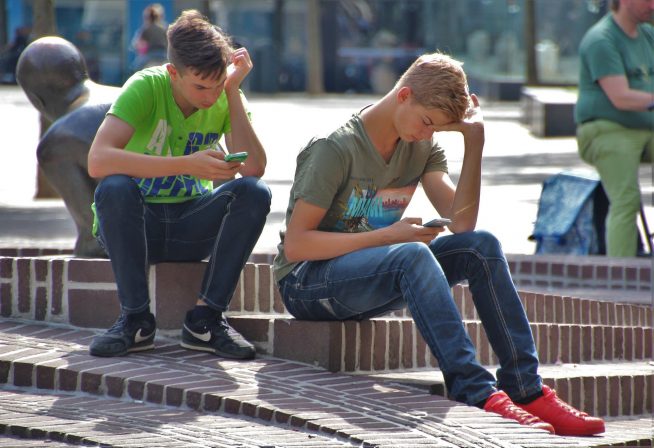A Rabbi said: “The way we usually approach loneliness is mostly by avoiding it, because we have all seen lonely people sitting next to other lonely people on lonely park benches, and they are the people we would least like to be. So we shy away from the subject altogether because in our idealized, packaged version of healthy adjustment, there is no room for loneliness, not even a little bit.”
The author Thomas Wolfe wrote in an essay entitled “Loneliness,” “that far from being a rare and curious phenomenon,” loneliness “is the central and inevitable fact of human existence.”
How sad that in the digital age the more we are connected to everything – the more we feel detached, isolated and separated. And we stare at our phones and hide behind the digital screens.
How often to I pass a bunch of teenagers sitting on the steps and not looking at each other or talking to their friends right there next to them.
“How is this a life?” asks a 30-something blogger.
It’s not a life, actually. We cannot spend our days hunched over a screen forging a sense of human interaction. This is not what we are made for. I can guarantee all your best memories live within the moments with others.
Recently, a congregant of mine suffered a loss and only found out about their bereavement when I happened to go on Facebook. I wrote to my Temple families and sermonized pleading with them to at least call me and the people close to them to hear our voices and let us go in person to comfort them.
The blogger Jamie Varon asked perceptively, “When you look back on your life will you be happy about how much you binged on Netflix? Will you be happy about the graveyard of plans you let fall by the wayside? Will you be happy when you are surrounded by no one because we’ve all pushed each other away?”
That’s an excerpt from her essay entitled, “This is the New Loneliness.” A New Loneliness has seized a new generation.
And maybe, when we ditch our phones and stop surfing and posting and liking, we should ask ourselves: why?
My wedding couple tell me that they met the old fashioned way because online dating – searching for suitable people all looking anonymously – only intensified their loneliness.
Now loneliness is viewed as a public health issue because researchers have found mounting evidence linking loneliness to physical illness and to cognitive decline.
A Rabbi asks us to examine ourselves honestly. How much loneliness have I brought upon myself through narcissism and a lack of self-awareness? Why not set aside your loneliness by doing something for someone else.
Anyone who serves at a homeless shelter, or tutors disadvantaged kids, or volunteers at a hospital, knows this.
From time to time, we are all lost and lonely in this impersonal world. So make real friends and reach out to the strangers and the estranged. And find your path in life together.
Rabbi Hirshel Jaffe, a cancer survivor, is a motivational/inspirational speaker on the theme NEVER GIVE UP! He authored “Why Me? Why Anyone?” which chronicles his rescue from leukemia and his spiritual triumph over despair. Known as “The Running Rabbi” for competing in the NY Marathon, he received the “Award of Courage” from President Ronald Reagan in a White House ceremony. Rabbi Jaffe was one of the clergy who visited the American hostages in Iran to offer them comfort and hope and was asked by the President to greet them at the White House upon their return. He received an honorary Doctorate from his seminary for “his work with the sick, and his noble influence upon all people. You can follow him on Facebook.
Image courtesy of natureaddict.












